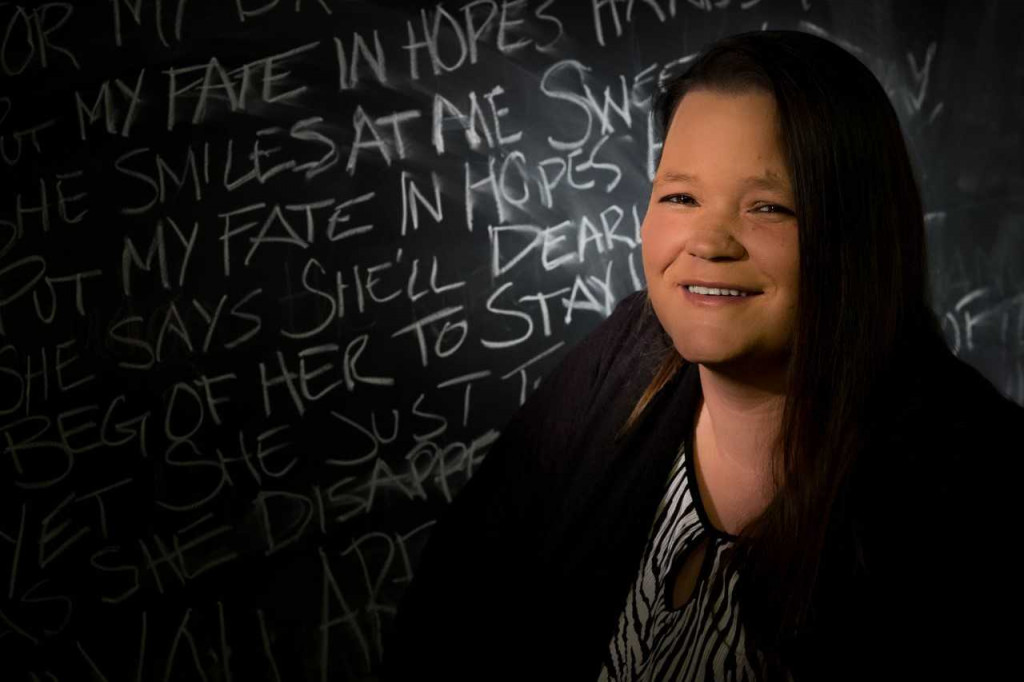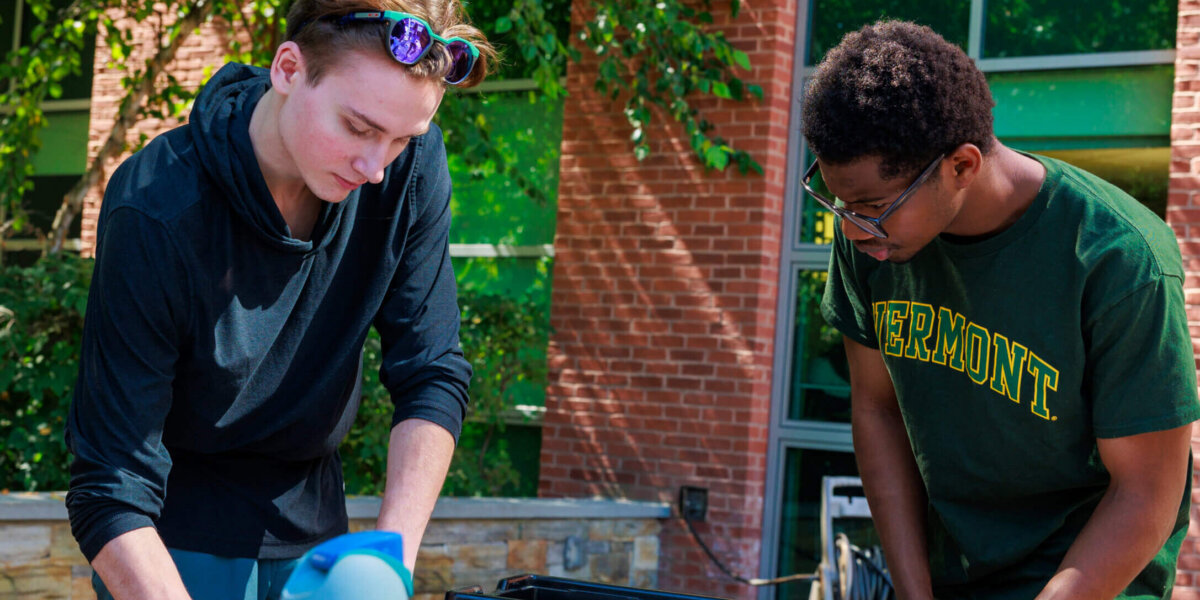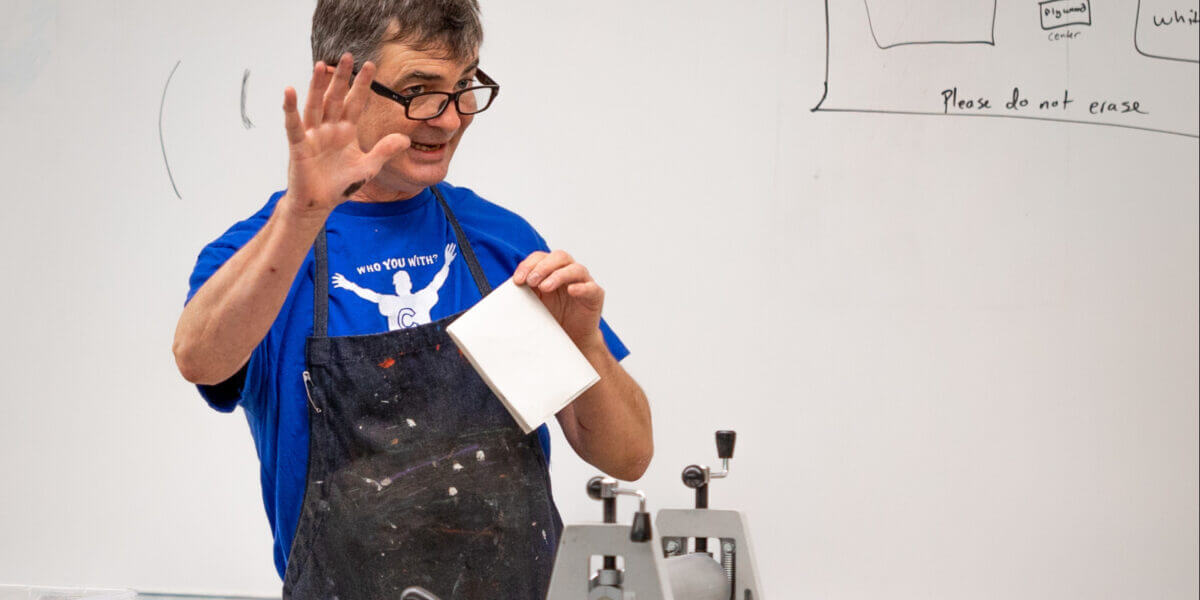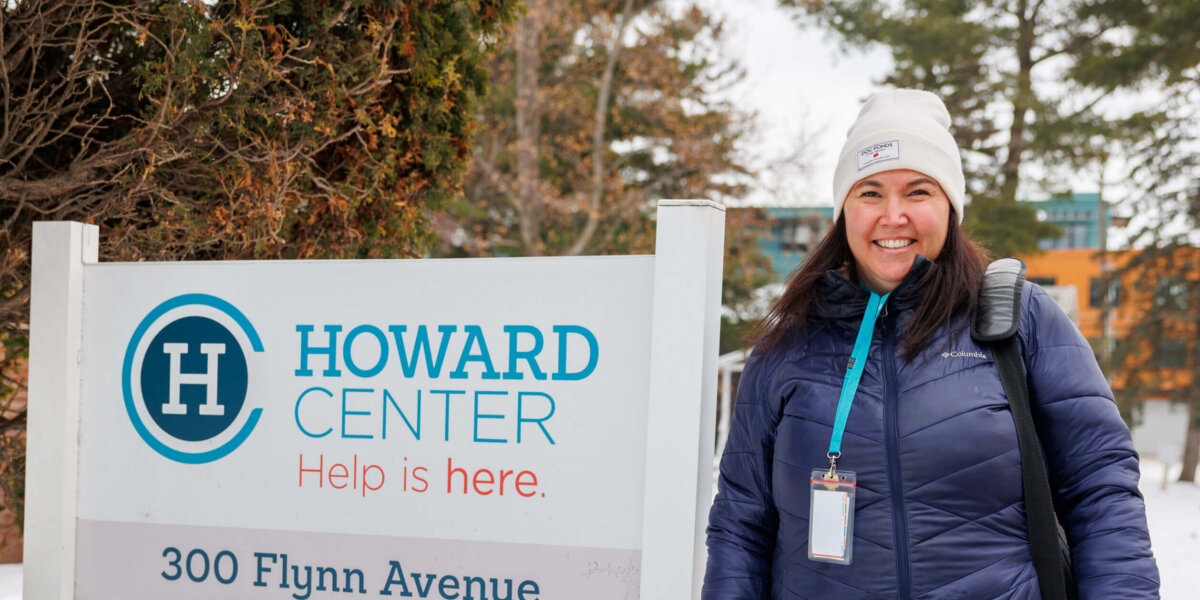CCV’s Student Leadership Scholarships are awarded annually to one student from each of CCV’s 13 academic centers. Each $1000 award is given in recognition of exemplary leadership demonstrated through academics, volunteerism, and community engagement. This year’s Leadership Scholars will be honored at a luncheon with CCV President Joyce Judy on Friday, March 16th.
This year, CCV Now features the stories of 2018 Scholars Shanna LaFlamme of Rutland and Tracy Moyer of Bennington.

For Shanna LaFlamme and Tracy Moyer, leadership starts with listening. Both are dedicated to helping their neighbors face mental health and substance abuse issues, and they say that often the most effective way to do that is by going back to the basics.
“Sometimes the best thing you can do is just talk it out,” says Shanna LaFlamme. “A lot of the time people are just looking for somebody to vent to, or somebody who actually cares.”
LaFlamme has been a volunteer at Rutland’s Turning Point Center, which provides recovery support, for two years. “I just like to help people,” she says. She’s also a student at CCV, and she is the winner of this year’s Leadership Scholarship for the Rutland academic center.
For this interview, LaFlamme sits across the table in a multipurpose room at the Turning Point Center. Bookshelves line the walls, stacked with board games, magazines, and art supplies. Well-worn chairs accompany a few computers, and a big window looks into the narrow hallway where volunteers and clients walk back and forth between offices and the kitchen, stopping to greet each other or fix a cup of coffee. The place has a restful feeling, a sense of refuge.
CCV’s 2018 Student Leadership Scholars
- Tracy Moyer, Bennington
- Trina Reynolds, Brattleboro
- Amanda Osgood, Center for Online Learning
- Farhad Khan, Middlebury
- Jessica MacAskill, Montpelier
- Justin Bourdeau, Morrisville
- Destiny Hall, Newport
- Shanna LaFlamme, Rutland
- Kristine Burpee, Springfield
- Kathrine Westover, St. Albans
- Heather Page-Class, St. Johnsbury
- Gikanh Timberwolf, Upper Valley
- Sean Connolly, Winooski
Meet the 2017 Student Leadership Scholars
The first thing LaFlamme says is brave: “I have 16 years sobriety.” Note the phrasing—not, “I have been sober for 16 years,” but “I have 16 years.” She emanates a sense of gratitude.
“I had it all. I had my own business. At 18 I owned my own home. I had everything I ever wanted,” she said. Then an accident led to a short but powerful addiction. “I lost everything. I sold my house for 1500 dollars just to get high. My business I lost because I went into treatment.” One day the eldest of her four children called and told her, “Mommy, we just want you to get better so you can come home and play with us again.” That was her own turning point.
LaFlamme went back to high school at 35. She completed classes at Vermont Adult Learning, where she was eventually introduced to CCV. “I had fun,” she says of starting college classes. “I loved it. I [had] wanted something more. I didn’t want to just get out of high school at 36 and do nothing.” She was curious about the Turning Point Center, and thought maybe she’d be able to help others who were going through an experience like the one she’d had. “I came here just for a job shadow and these guys became my family. So now I volunteer here.” It’s been almost two years of volunteering as many as 25 hours of her time each week. She started out as a peer support, offering general help for people “when they’re having a rough day.” But since then she’s taken advantage of trainings through Turning Point and she’s now a recovery coach, which allows her to offer intensive one-on-one guidance throughout a client’s recovery process.
LaFlamme is taking classes at CCV toward a degree in Human Services, with a certificate in Substance Abuse Services. Her ultimate goal is to become a Licensed Alcohol and Drug Counselor (LADC). “That is my dream,” she says. “I just know what I went through, and I know that having firsthand knowledge is beneficial to a lot of people who are struggling with addiction. Just being able to have a conversation and being able to tell somebody ‘listen, I know what you’re going through, I have been there…it sets them a little bit at ease. [It] helps them to know that they’re not alone. [It] gives them some hope.”
That simple act of conversation can be transformative, for clients as well as volunteers. “When you see that person [who comes] back time and time again…they walk in the door and they don’t know what they’re doing, or where to get help. [They] didn’t even know if they wanted to be here…and then you see that person come back and, you know, reach out a little more, and open up a little more…it’s rewarding.”
Tracy Moyer has worked at Bennington’s United Counseling Service (UCS) for 19 years, and she’s currently the medical assistant for the psychiatry team. “The reason I was interested and had applied there to begin with was because I lost my father to suicide when I was 18,” said Moyer. “I really wanted to work in a mental health agency, partly because I wanted to help other people so that other families wouldn’t go through what I went through, but I also wanted to learn more about why people get to that point, what causes those types of mental health disorders.”
She says she’s on the right path. “I absolutely love my job. I love what I do. I love a lot of the coworkers and have some really great people in the community that I’ve met through UCS so it’s been a really rewarding experience for me.” Moyer says her work at UCS is driven by a desire to be of service to others. “I didn’t stay for 20 years because I was getting rich off what I was doing…I’m devoted to what I do. I’m really passionate about helping other people.”
Moyer is in the Allied Health Prep program at CCV, and has plans to transfer to Vermont Tech’s nursing program. In her world, degrees make a difference. “In my job I’m helpful to a point…but I legally can’t do a lot of different things without a degree and so I know that there’s so many more opportunities there for me to help people. I just need to get that degree in order to do that, and so that really drives me,” she said. “My plan is to get my LPN, then get my RN, then move on to my BSN. And then I’d really like to go on to nurse practitioner school for psychiatry.” Moyer is a mother of two—one of her sons is a fellow student at CCV—and she’s also a Peer Academic Mentor.
She says the help her peers need isn’t always with writing or math, but basic support. Like LaFlamme, Moyer knows that listening goes a long way. “Sometimes if you just take a few minutes and you just really listen to what somebody else has to say, sometimes they don’t even really need you to do anything, they just need someone to listen. They want to be heard, and they want to feel like ‘okay, there’s somebody else out there who felt similar and got through it, and I can too.’”
Moyer says this approach has real impacts. “I had one student my first semester of mentoring, she was feeling good about a paper, she turned it in, she got a C. She came to me that week and was crying. I said, ‘talk to your [instructor] and see if you can revise your essay for a better grade.’ And so she did, and her [instructor] said yes, and so I sat with her in the learning center for probably fifteen minutes, gave her a few pointers, she went home, she redid her paper, she turned it back in, she got an A…to me, that’s what being a successful leader means. [It’s about] really taking the time to listen to people.”
Moyer says she was surprised to find out that she’d been chosen for CCV-Bennington’s 2018 Leadership Scholarship, “…and then I talked to a few people around CCV and none of [them] were surprised that I won it, which was surprising to me again.” Still, she’s aware of the impact she has on others. “I think that it’s my attitude more than anything.” In her experience as a Peer Mentor, she says, “a couple of times I have encountered students in the learning center that are very doubtful of themselves. [They say things like] ‘I don’t understand this assignment, I can’t do it…I’m gonna fail,’ and I’m like, ‘no, you’re not…you have the tools to be successful. You just have to believe in yourself.’”
“I use the philosophy of ‘pretend this is your kid,’” says Moyer. “‘He’s struggling with his homework. He doesn’t get it. And how long are you going to sit with him, how much compassion are you going to show?’ You need to do that with everybody.”






